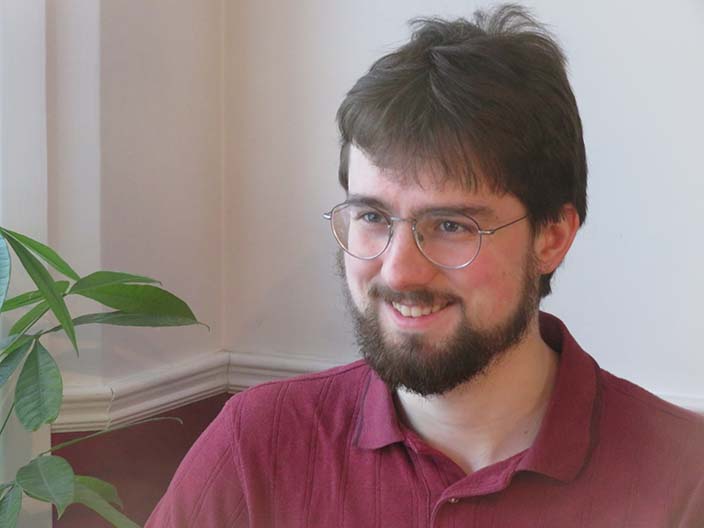Due to the pandemic, the King’s alum and Gates Scholar is continuing his studies at Cambridge from his hometown
Cédric Blais, BA(Hons)’20, didn’t have a backup plan.
Last year, after being accepted to Cambridge University to do an MPhil (Master of Philosophy) in the History and Philosophy of Science of Medicine, Blais decided to apply for a Gates Cambridge Scholarship. The scholarships, endowed by the Bill and Melinda Gates Foundation, cover the full cost of attending the university.
It was the only scholarship for which Blais applied.
“I would have been much more stressed about the Gates Scholarship if I’d known what it was when I was applying for it, because by the time I got it, I was told that they only give it to about 80 people—and 25 of those are in the United States,” Blais said. “I was very, very careless in essentially betting my entire future at Cambridge on that one scholarship.”

Last fall, after getting the prestigious scholarship, Blais headed off to Cambridge, where he is working with Dr. Hasok Chang, a noted historian and philosopher of science. (“At King’s we are very big fans of his work,” Blais said.)
But it wasn’t your typical Cambridge experience, since all classes were online because of the pandemic.
“It’s a beautiful town and I enjoyed the scenery,” Blais said. “But the famous British pub culture remained closed to me.”
The MPhil degree gives students a lot of latitude, allowing them to follow their interests over three in-depth papers and a dissertation. So far, Blais has written about mapping the networks of relationships in ecological communities as a way to understand their robustness, how to determine whether organisms such as microbes or plants are conscious—and, most recently, on the beliefs of those who hold that the earth is flat.
Blais became fascinated by the observations and experiments flat-earthers harnessed to uphold their beliefs. “I was trying to understand how these people could go so wrong while [they were] at the same time trying to do something that at least looks like science,” he said.
He gave the example of a ship’s hull disappearing over the horizon before its mast—a result of the curvature of the earth. “Flat-earthers are quite keen on making experiments that demonstrate very clearly that it’s actually possible to see much farther than the curvature of the earth should allow. And those results are perfectly valid. But their interpretation of them is problematic, because we can easily explain that discrepancy through refraction.”
Blais added, “A common way of thinking about pseudo-science is that pseudo-scientists are kind of disconnected from reality. They avoid any contradictory information and they’re not interested in correcting mistakes in their theories when they’re pointed out to them. One of the fascinating things to me is that, on the contrary, none of that seems to be completely true, at least for flat-earthers.”
Of course, there was a time when the greatest minds on the planet believed the earth was flat. It was the dominant cosmology, or understanding of the nature of the universe.
“If you look back a bit, over 2,000 years ago, you eventually hit on a period where the belief that the earth is flat was held by the most educated, scientifically-minded people of the time. So looking at ancient cosmology that believed in a flat earth was a way to try to understand how one might sustain that belief.”
While it’s easy to dismiss flat-earthers, Blais said that would be a mistake, especially in the context of what he called, “the general degradation of trust in science.” He added, “One reason for treating them seriously, I think, is that they take themselves so seriously.”
The flat-earth study done, Blais turns next to his dissertation, which is about bridging the gap between philosophers of science and “the nitty-gritty of lab work.” The dissertation is a “spiritual sequel” to Blais’ undergraduate thesis, and, he said, “It’s the kind of situation where you hope it’s going to be The Empire Strikes Back and not Jaws 2.”
Blais has been back in Halifax since December, continuing his studies online. Students were encouraged to go home for the holidays. But then cases spiked in the UK, there was a renewed lockdown, and the university asked those who could study from home to do so.
While not being able to meet with his supervisor in person or attend classes on campus at Cambridge has been “a disappointment,” Blais said access to materials has not been an issue. There have only been “one or two occasions” when a book he wanted from Cambridge was not available.
The Gates Scholarships aim to build a network of global leaders dedicated to helping others. It’s what Blais called “the classic ‘leaders of tomorrow’ kind of situation.”
It’s a perfect fit for him—a young scholar with a lively mind and extensive interests. And he may get to return to Cambridge as well. With high vaccination rates in the UK and new infections dropping, Blais said he’s had encouraging signals that he may be able to head back by the end of April, in time for what’s known as Easter Term. Maybe he’ll get to enjoy some of that pub culture after all.

